Reflective Practice in Health and Social Care
VerifiedAdded on 2023/06/11
|18
|5810
|487
AI Summary
This presentation discusses the importance of reflective practice in health and social care, including CPD standards, theoretical perspectives on reflection, methods to acknowledge and plan for professional development needs, and sources of support for learning and development. It covers the role of practitioners in the sector and highlights the benefits of continuing professional development. The presentation also includes a discussion of the standards associated with professional development and the methods used to acknowledge and plan for professional development needs.
Contribute Materials
Your contribution can guide someone’s learning journey. Share your
documents today.
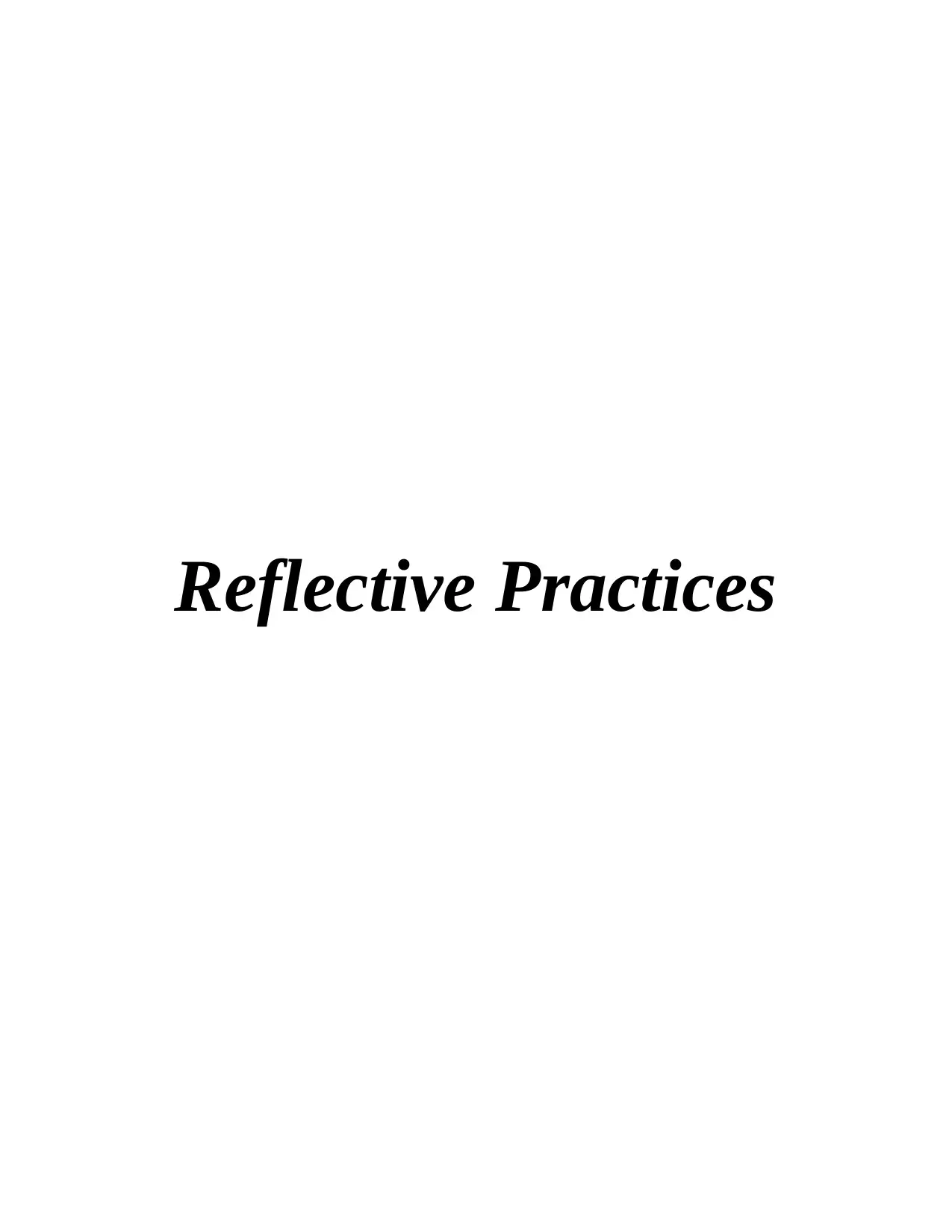
Reflective Practices
Secure Best Marks with AI Grader
Need help grading? Try our AI Grader for instant feedback on your assignments.
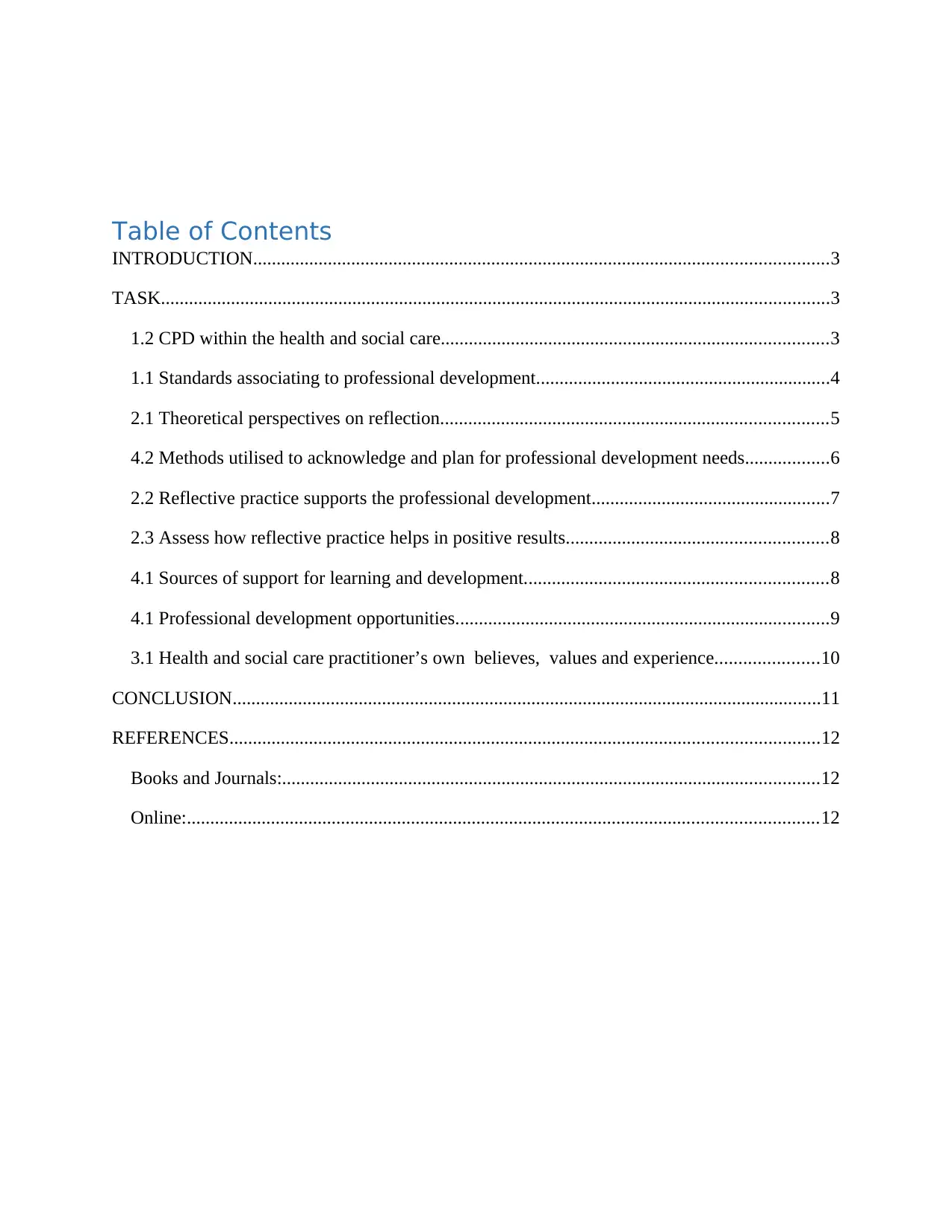
Table of Contents
INTRODUCTION...........................................................................................................................3
TASK...............................................................................................................................................3
1.2 CPD within the health and social care...................................................................................3
1.1 Standards associating to professional development...............................................................4
2.1 Theoretical perspectives on reflection...................................................................................5
4.2 Methods utilised to acknowledge and plan for professional development needs..................6
2.2 Reflective practice supports the professional development...................................................7
2.3 Assess how reflective practice helps in positive results........................................................8
4.1 Sources of support for learning and development.................................................................8
4.1 Professional development opportunities................................................................................9
3.1 Health and social care practitioner’s own believes, values and experience......................10
CONCLUSION..............................................................................................................................11
REFERENCES..............................................................................................................................12
Books and Journals:...................................................................................................................12
Online:.......................................................................................................................................12
INTRODUCTION...........................................................................................................................3
TASK...............................................................................................................................................3
1.2 CPD within the health and social care...................................................................................3
1.1 Standards associating to professional development...............................................................4
2.1 Theoretical perspectives on reflection...................................................................................5
4.2 Methods utilised to acknowledge and plan for professional development needs..................6
2.2 Reflective practice supports the professional development...................................................7
2.3 Assess how reflective practice helps in positive results........................................................8
4.1 Sources of support for learning and development.................................................................8
4.1 Professional development opportunities................................................................................9
3.1 Health and social care practitioner’s own believes, values and experience......................10
CONCLUSION..............................................................................................................................11
REFERENCES..............................................................................................................................12
Books and Journals:...................................................................................................................12
Online:.......................................................................................................................................12

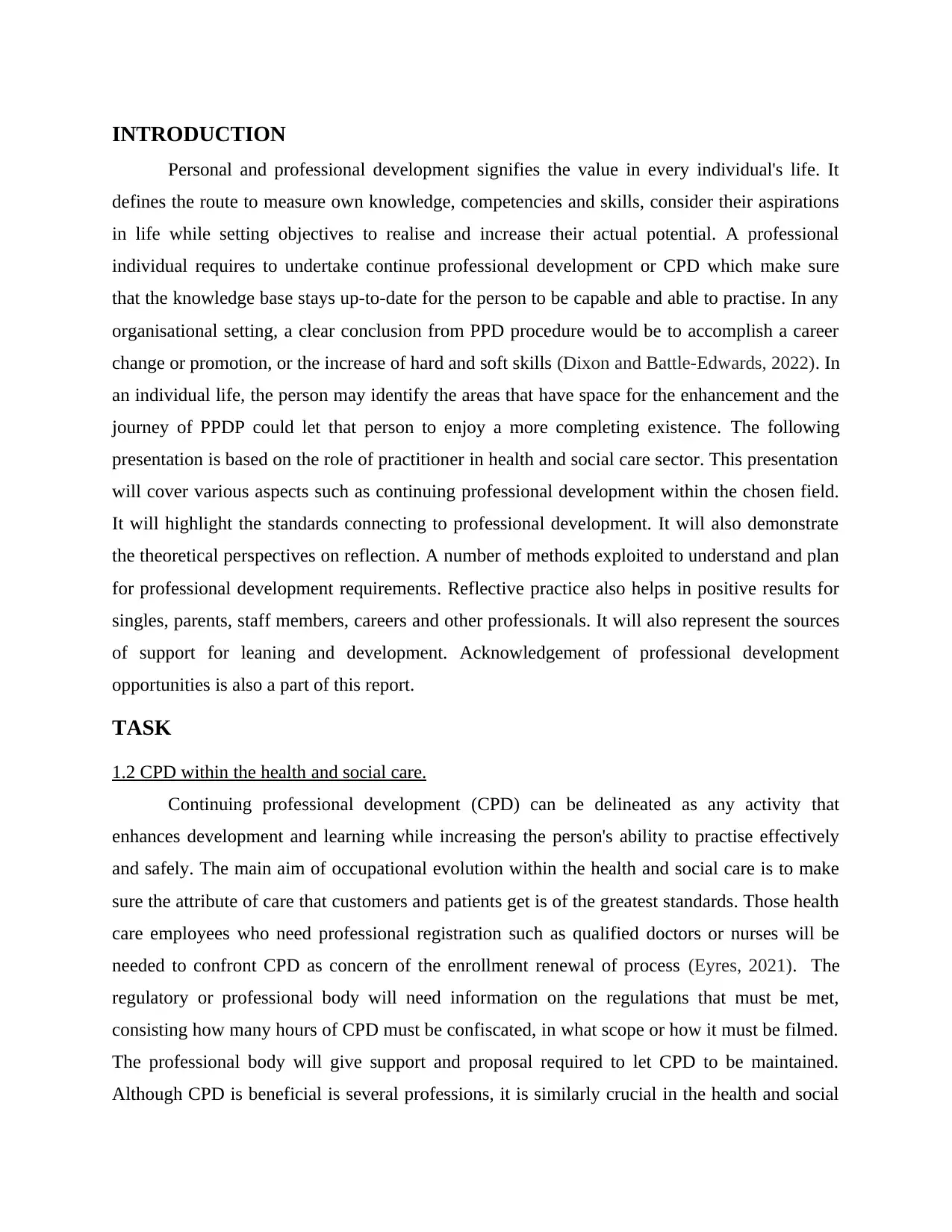
INTRODUCTION
Personal and professional development signifies the value in every individual's life. It
defines the route to measure own knowledge, competencies and skills, consider their aspirations
in life while setting objectives to realise and increase their actual potential. A professional
individual requires to undertake continue professional development or CPD which make sure
that the knowledge base stays up-to-date for the person to be capable and able to practise. In any
organisational setting, a clear conclusion from PPD procedure would be to accomplish a career
change or promotion, or the increase of hard and soft skills (Dixon and Battle-Edwards, 2022). In
an individual life, the person may identify the areas that have space for the enhancement and the
journey of PPDP could let that person to enjoy a more completing existence. The following
presentation is based on the role of practitioner in health and social care sector. This presentation
will cover various aspects such as continuing professional development within the chosen field.
It will highlight the standards connecting to professional development. It will also demonstrate
the theoretical perspectives on reflection. A number of methods exploited to understand and plan
for professional development requirements. Reflective practice also helps in positive results for
singles, parents, staff members, careers and other professionals. It will also represent the sources
of support for leaning and development. Acknowledgement of professional development
opportunities is also a part of this report.
TASK
1.2 CPD within the health and social care.
Continuing professional development (CPD) can be delineated as any activity that
enhances development and learning while increasing the person's ability to practise effectively
and safely. The main aim of occupational evolution within the health and social care is to make
sure the attribute of care that customers and patients get is of the greatest standards. Those health
care employees who need professional registration such as qualified doctors or nurses will be
needed to confront CPD as concern of the enrollment renewal of process (Eyres, 2021). The
regulatory or professional body will need information on the regulations that must be met,
consisting how many hours of CPD must be confiscated, in what scope or how it must be filmed.
The professional body will give support and proposal required to let CPD to be maintained.
Although CPD is beneficial is several professions, it is similarly crucial in the health and social
Personal and professional development signifies the value in every individual's life. It
defines the route to measure own knowledge, competencies and skills, consider their aspirations
in life while setting objectives to realise and increase their actual potential. A professional
individual requires to undertake continue professional development or CPD which make sure
that the knowledge base stays up-to-date for the person to be capable and able to practise. In any
organisational setting, a clear conclusion from PPD procedure would be to accomplish a career
change or promotion, or the increase of hard and soft skills (Dixon and Battle-Edwards, 2022). In
an individual life, the person may identify the areas that have space for the enhancement and the
journey of PPDP could let that person to enjoy a more completing existence. The following
presentation is based on the role of practitioner in health and social care sector. This presentation
will cover various aspects such as continuing professional development within the chosen field.
It will highlight the standards connecting to professional development. It will also demonstrate
the theoretical perspectives on reflection. A number of methods exploited to understand and plan
for professional development requirements. Reflective practice also helps in positive results for
singles, parents, staff members, careers and other professionals. It will also represent the sources
of support for leaning and development. Acknowledgement of professional development
opportunities is also a part of this report.
TASK
1.2 CPD within the health and social care.
Continuing professional development (CPD) can be delineated as any activity that
enhances development and learning while increasing the person's ability to practise effectively
and safely. The main aim of occupational evolution within the health and social care is to make
sure the attribute of care that customers and patients get is of the greatest standards. Those health
care employees who need professional registration such as qualified doctors or nurses will be
needed to confront CPD as concern of the enrollment renewal of process (Eyres, 2021). The
regulatory or professional body will need information on the regulations that must be met,
consisting how many hours of CPD must be confiscated, in what scope or how it must be filmed.
The professional body will give support and proposal required to let CPD to be maintained.
Although CPD is beneficial is several professions, it is similarly crucial in the health and social
Secure Best Marks with AI Grader
Need help grading? Try our AI Grader for instant feedback on your assignments.
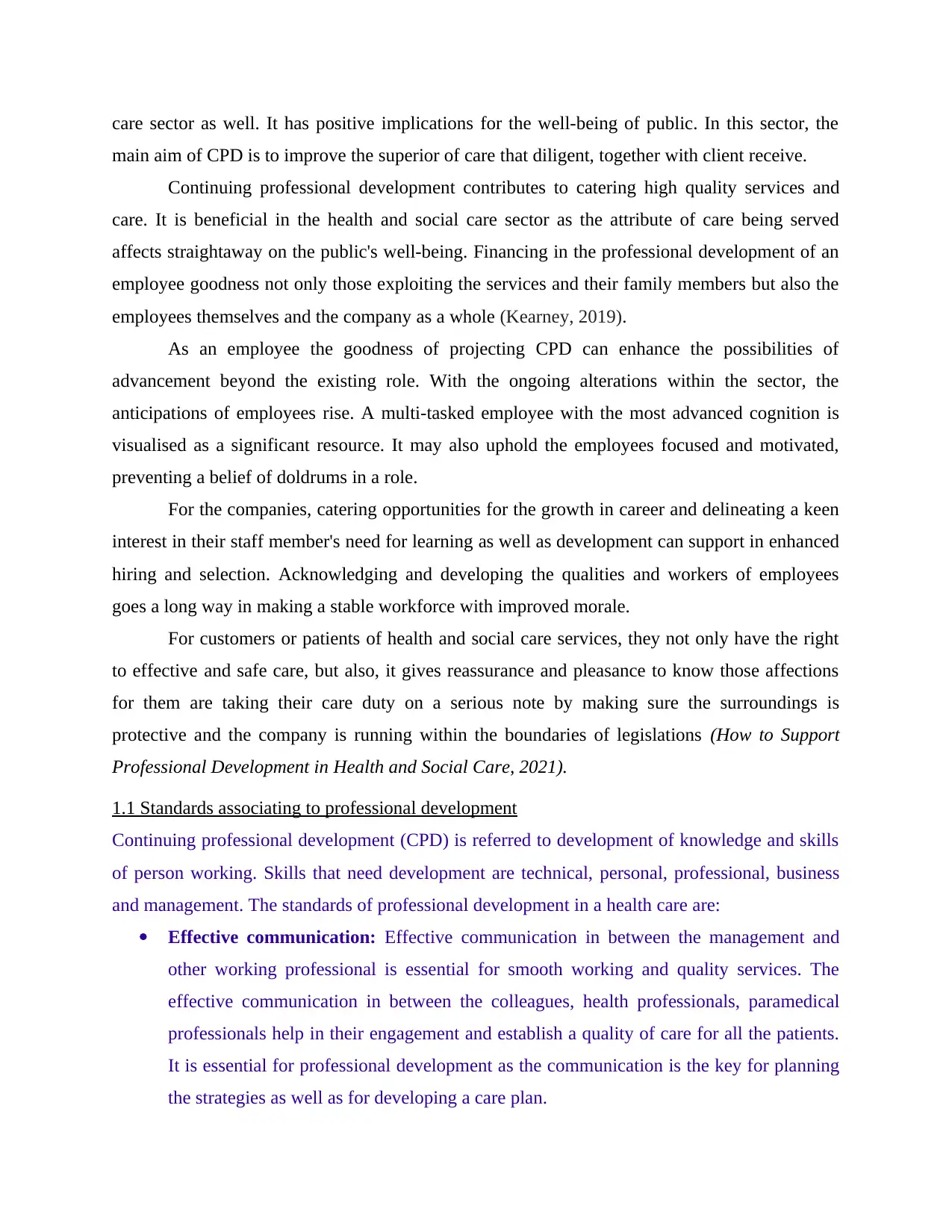
care sector as well. It has positive implications for the well-being of public. In this sector, the
main aim of CPD is to improve the superior of care that diligent, together with client receive.
Continuing professional development contributes to catering high quality services and
care. It is beneficial in the health and social care sector as the attribute of care being served
affects straightaway on the public's well-being. Financing in the professional development of an
employee goodness not only those exploiting the services and their family members but also the
employees themselves and the company as a whole (Kearney, 2019).
As an employee the goodness of projecting CPD can enhance the possibilities of
advancement beyond the existing role. With the ongoing alterations within the sector, the
anticipations of employees rise. A multi-tasked employee with the most advanced cognition is
visualised as a significant resource. It may also uphold the employees focused and motivated,
preventing a belief of doldrums in a role.
For the companies, catering opportunities for the growth in career and delineating a keen
interest in their staff member's need for learning as well as development can support in enhanced
hiring and selection. Acknowledging and developing the qualities and workers of employees
goes a long way in making a stable workforce with improved morale.
For customers or patients of health and social care services, they not only have the right
to effective and safe care, but also, it gives reassurance and pleasance to know those affections
for them are taking their care duty on a serious note by making sure the surroundings is
protective and the company is running within the boundaries of legislations (How to Support
Professional Development in Health and Social Care, 2021).
1.1 Standards associating to professional development
Continuing professional development (CPD) is referred to development of knowledge and skills
of person working. Skills that need development are technical, personal, professional, business
and management. The standards of professional development in a health care are:
Effective communication: Effective communication in between the management and
other working professional is essential for smooth working and quality services. The
effective communication in between the colleagues, health professionals, paramedical
professionals help in their engagement and establish a quality of care for all the patients.
It is essential for professional development as the communication is the key for planning
the strategies as well as for developing a care plan.
main aim of CPD is to improve the superior of care that diligent, together with client receive.
Continuing professional development contributes to catering high quality services and
care. It is beneficial in the health and social care sector as the attribute of care being served
affects straightaway on the public's well-being. Financing in the professional development of an
employee goodness not only those exploiting the services and their family members but also the
employees themselves and the company as a whole (Kearney, 2019).
As an employee the goodness of projecting CPD can enhance the possibilities of
advancement beyond the existing role. With the ongoing alterations within the sector, the
anticipations of employees rise. A multi-tasked employee with the most advanced cognition is
visualised as a significant resource. It may also uphold the employees focused and motivated,
preventing a belief of doldrums in a role.
For the companies, catering opportunities for the growth in career and delineating a keen
interest in their staff member's need for learning as well as development can support in enhanced
hiring and selection. Acknowledging and developing the qualities and workers of employees
goes a long way in making a stable workforce with improved morale.
For customers or patients of health and social care services, they not only have the right
to effective and safe care, but also, it gives reassurance and pleasance to know those affections
for them are taking their care duty on a serious note by making sure the surroundings is
protective and the company is running within the boundaries of legislations (How to Support
Professional Development in Health and Social Care, 2021).
1.1 Standards associating to professional development
Continuing professional development (CPD) is referred to development of knowledge and skills
of person working. Skills that need development are technical, personal, professional, business
and management. The standards of professional development in a health care are:
Effective communication: Effective communication in between the management and
other working professional is essential for smooth working and quality services. The
effective communication in between the colleagues, health professionals, paramedical
professionals help in their engagement and establish a quality of care for all the patients.
It is essential for professional development as the communication is the key for planning
the strategies as well as for developing a care plan.
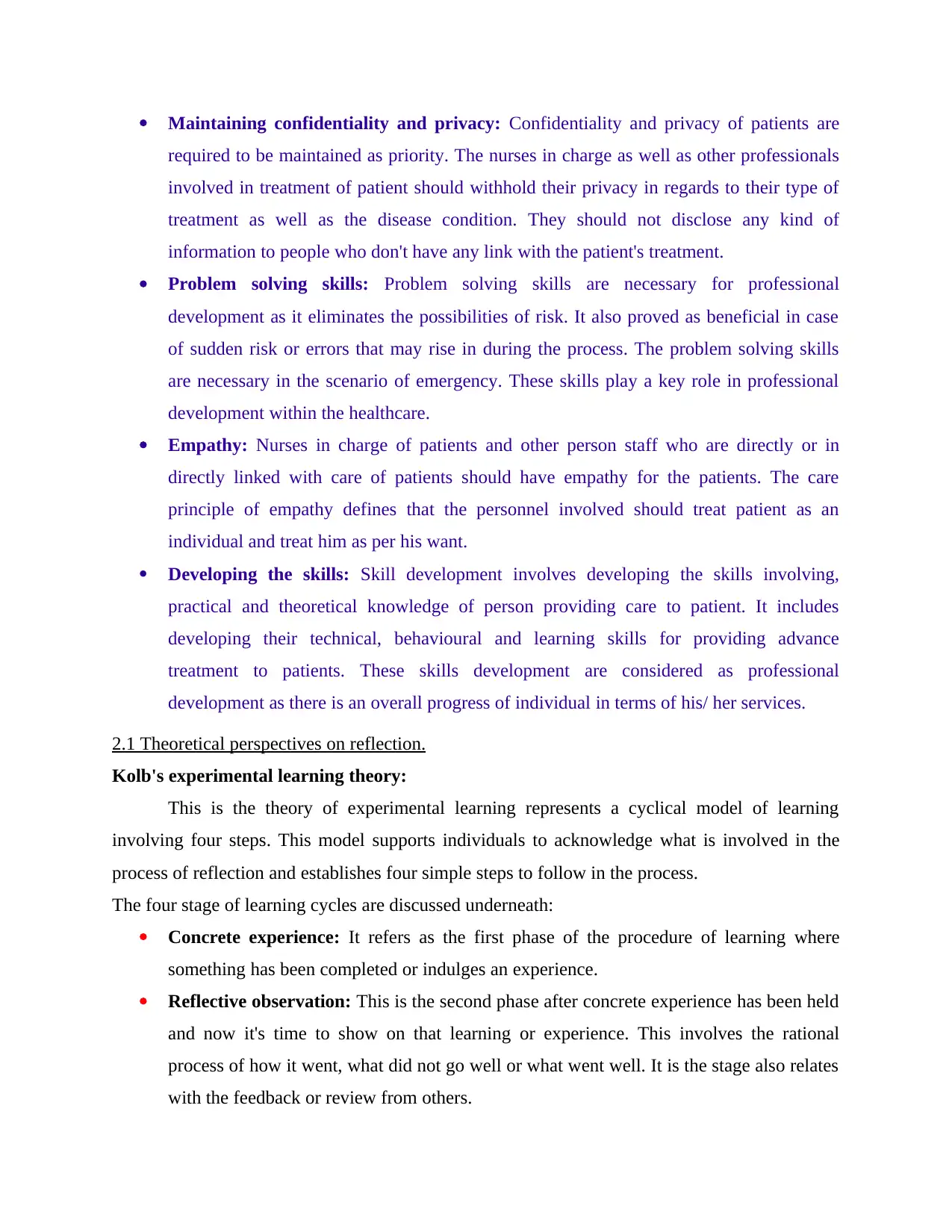
Maintaining confidentiality and privacy: Confidentiality and privacy of patients are
required to be maintained as priority. The nurses in charge as well as other professionals
involved in treatment of patient should withhold their privacy in regards to their type of
treatment as well as the disease condition. They should not disclose any kind of
information to people who don't have any link with the patient's treatment.
Problem solving skills: Problem solving skills are necessary for professional
development as it eliminates the possibilities of risk. It also proved as beneficial in case
of sudden risk or errors that may rise in during the process. The problem solving skills
are necessary in the scenario of emergency. These skills play a key role in professional
development within the healthcare.
Empathy: Nurses in charge of patients and other person staff who are directly or in
directly linked with care of patients should have empathy for the patients. The care
principle of empathy defines that the personnel involved should treat patient as an
individual and treat him as per his want.
Developing the skills: Skill development involves developing the skills involving,
practical and theoretical knowledge of person providing care to patient. It includes
developing their technical, behavioural and learning skills for providing advance
treatment to patients. These skills development are considered as professional
development as there is an overall progress of individual in terms of his/ her services.
2.1 Theoretical perspectives on reflection.
Kolb's experimental learning theory:
This is the theory of experimental learning represents a cyclical model of learning
involving four steps. This model supports individuals to acknowledge what is involved in the
process of reflection and establishes four simple steps to follow in the process.
The four stage of learning cycles are discussed underneath:
Concrete experience: It refers as the first phase of the procedure of learning where
something has been completed or indulges an experience.
Reflective observation: This is the second phase after concrete experience has been held
and now it's time to show on that learning or experience. This involves the rational
process of how it went, what did not go well or what went well. It is the stage also relates
with the feedback or review from others.
required to be maintained as priority. The nurses in charge as well as other professionals
involved in treatment of patient should withhold their privacy in regards to their type of
treatment as well as the disease condition. They should not disclose any kind of
information to people who don't have any link with the patient's treatment.
Problem solving skills: Problem solving skills are necessary for professional
development as it eliminates the possibilities of risk. It also proved as beneficial in case
of sudden risk or errors that may rise in during the process. The problem solving skills
are necessary in the scenario of emergency. These skills play a key role in professional
development within the healthcare.
Empathy: Nurses in charge of patients and other person staff who are directly or in
directly linked with care of patients should have empathy for the patients. The care
principle of empathy defines that the personnel involved should treat patient as an
individual and treat him as per his want.
Developing the skills: Skill development involves developing the skills involving,
practical and theoretical knowledge of person providing care to patient. It includes
developing their technical, behavioural and learning skills for providing advance
treatment to patients. These skills development are considered as professional
development as there is an overall progress of individual in terms of his/ her services.
2.1 Theoretical perspectives on reflection.
Kolb's experimental learning theory:
This is the theory of experimental learning represents a cyclical model of learning
involving four steps. This model supports individuals to acknowledge what is involved in the
process of reflection and establishes four simple steps to follow in the process.
The four stage of learning cycles are discussed underneath:
Concrete experience: It refers as the first phase of the procedure of learning where
something has been completed or indulges an experience.
Reflective observation: This is the second phase after concrete experience has been held
and now it's time to show on that learning or experience. This involves the rational
process of how it went, what did not go well or what went well. It is the stage also relates
with the feedback or review from others.
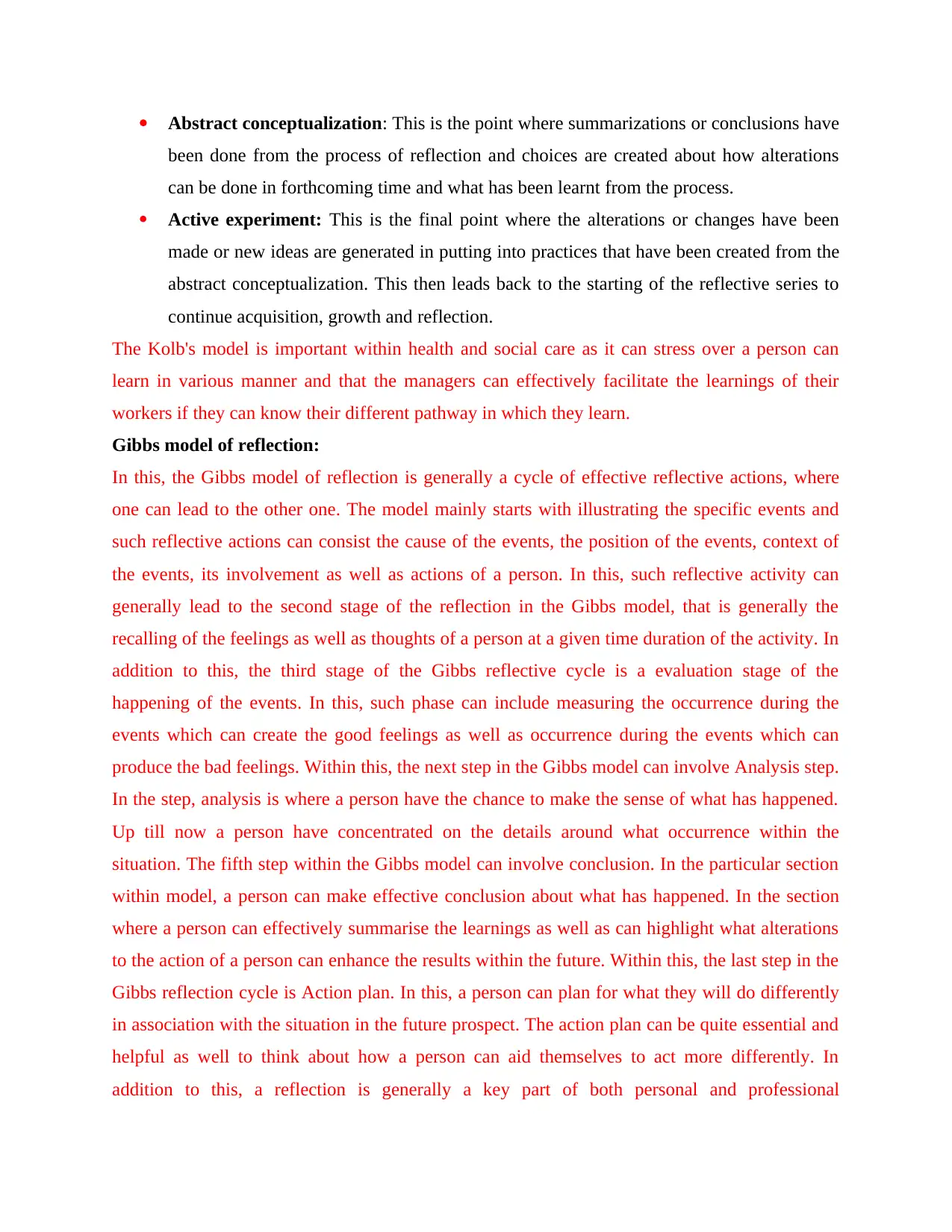
Abstract conceptualization: This is the point where summarizations or conclusions have
been done from the process of reflection and choices are created about how alterations
can be done in forthcoming time and what has been learnt from the process.
Active experiment: This is the final point where the alterations or changes have been
made or new ideas are generated in putting into practices that have been created from the
abstract conceptualization. This then leads back to the starting of the reflective series to
continue acquisition, growth and reflection.
The Kolb's model is important within health and social care as it can stress over a person can
learn in various manner and that the managers can effectively facilitate the learnings of their
workers if they can know their different pathway in which they learn.
Gibbs model of reflection:
In this, the Gibbs model of reflection is generally a cycle of effective reflective actions, where
one can lead to the other one. The model mainly starts with illustrating the specific events and
such reflective actions can consist the cause of the events, the position of the events, context of
the events, its involvement as well as actions of a person. In this, such reflective activity can
generally lead to the second stage of the reflection in the Gibbs model, that is generally the
recalling of the feelings as well as thoughts of a person at a given time duration of the activity. In
addition to this, the third stage of the Gibbs reflective cycle is a evaluation stage of the
happening of the events. In this, such phase can include measuring the occurrence during the
events which can create the good feelings as well as occurrence during the events which can
produce the bad feelings. Within this, the next step in the Gibbs model can involve Analysis step.
In the step, analysis is where a person have the chance to make the sense of what has happened.
Up till now a person have concentrated on the details around what occurrence within the
situation. The fifth step within the Gibbs model can involve conclusion. In the particular section
within model, a person can make effective conclusion about what has happened. In the section
where a person can effectively summarise the learnings as well as can highlight what alterations
to the action of a person can enhance the results within the future. Within this, the last step in the
Gibbs reflection cycle is Action plan. In this, a person can plan for what they will do differently
in association with the situation in the future prospect. The action plan can be quite essential and
helpful as well to think about how a person can aid themselves to act more differently. In
addition to this, a reflection is generally a key part of both personal and professional
been done from the process of reflection and choices are created about how alterations
can be done in forthcoming time and what has been learnt from the process.
Active experiment: This is the final point where the alterations or changes have been
made or new ideas are generated in putting into practices that have been created from the
abstract conceptualization. This then leads back to the starting of the reflective series to
continue acquisition, growth and reflection.
The Kolb's model is important within health and social care as it can stress over a person can
learn in various manner and that the managers can effectively facilitate the learnings of their
workers if they can know their different pathway in which they learn.
Gibbs model of reflection:
In this, the Gibbs model of reflection is generally a cycle of effective reflective actions, where
one can lead to the other one. The model mainly starts with illustrating the specific events and
such reflective actions can consist the cause of the events, the position of the events, context of
the events, its involvement as well as actions of a person. In this, such reflective activity can
generally lead to the second stage of the reflection in the Gibbs model, that is generally the
recalling of the feelings as well as thoughts of a person at a given time duration of the activity. In
addition to this, the third stage of the Gibbs reflective cycle is a evaluation stage of the
happening of the events. In this, such phase can include measuring the occurrence during the
events which can create the good feelings as well as occurrence during the events which can
produce the bad feelings. Within this, the next step in the Gibbs model can involve Analysis step.
In the step, analysis is where a person have the chance to make the sense of what has happened.
Up till now a person have concentrated on the details around what occurrence within the
situation. The fifth step within the Gibbs model can involve conclusion. In the particular section
within model, a person can make effective conclusion about what has happened. In the section
where a person can effectively summarise the learnings as well as can highlight what alterations
to the action of a person can enhance the results within the future. Within this, the last step in the
Gibbs reflection cycle is Action plan. In this, a person can plan for what they will do differently
in association with the situation in the future prospect. The action plan can be quite essential and
helpful as well to think about how a person can aid themselves to act more differently. In
addition to this, a reflection is generally a key part of both personal and professional
Paraphrase This Document
Need a fresh take? Get an instant paraphrase of this document with our AI Paraphraser
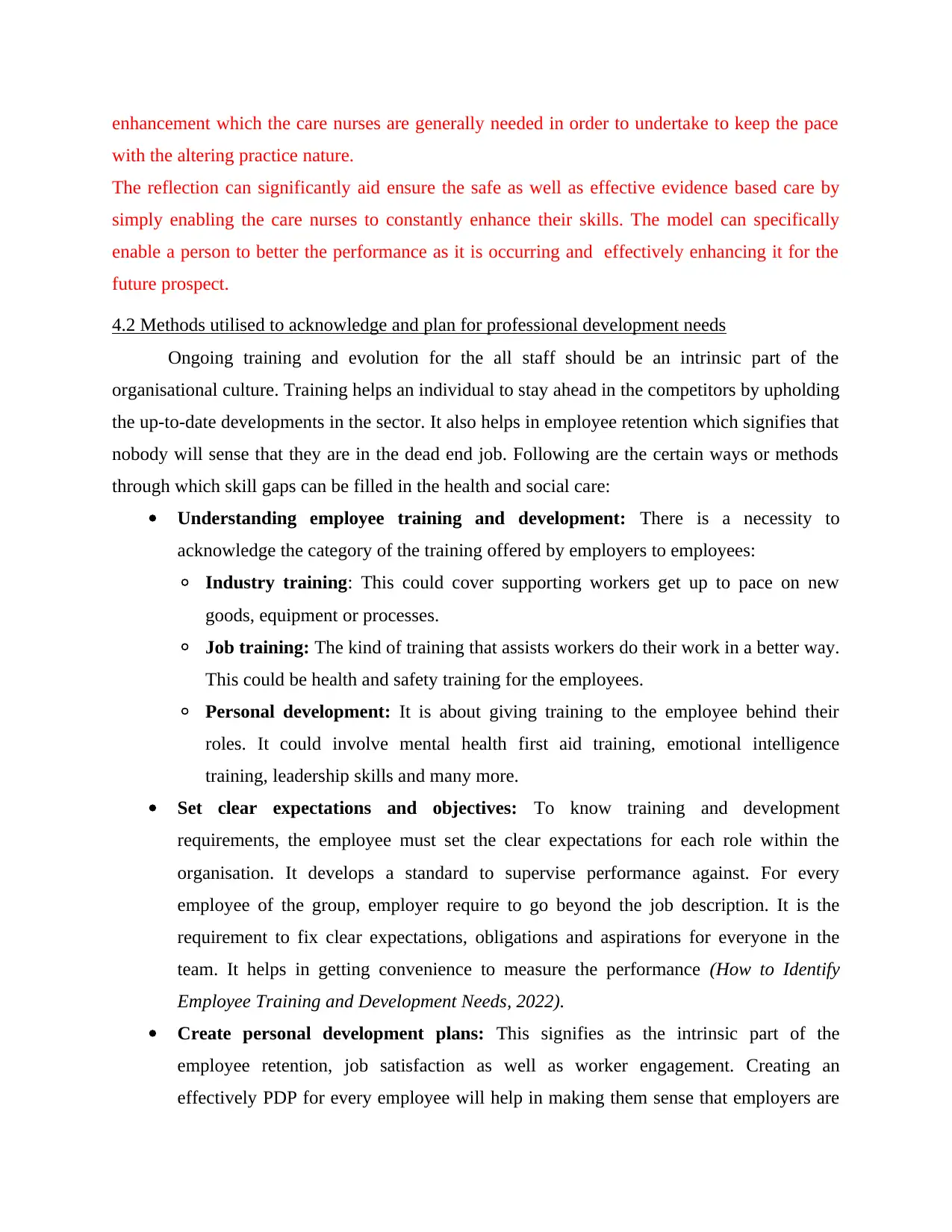
enhancement which the care nurses are generally needed in order to undertake to keep the pace
with the altering practice nature.
The reflection can significantly aid ensure the safe as well as effective evidence based care by
simply enabling the care nurses to constantly enhance their skills. The model can specifically
enable a person to better the performance as it is occurring and effectively enhancing it for the
future prospect.
4.2 Methods utilised to acknowledge and plan for professional development needs
Ongoing training and evolution for the all staff should be an intrinsic part of the
organisational culture. Training helps an individual to stay ahead in the competitors by upholding
the up-to-date developments in the sector. It also helps in employee retention which signifies that
nobody will sense that they are in the dead end job. Following are the certain ways or methods
through which skill gaps can be filled in the health and social care:
Understanding employee training and development: There is a necessity to
acknowledge the category of the training offered by employers to employees:
◦ Industry training: This could cover supporting workers get up to pace on new
goods, equipment or processes.
◦ Job training: The kind of training that assists workers do their work in a better way.
This could be health and safety training for the employees.
◦ Personal development: It is about giving training to the employee behind their
roles. It could involve mental health first aid training, emotional intelligence
training, leadership skills and many more.
Set clear expectations and objectives: To know training and development
requirements, the employee must set the clear expectations for each role within the
organisation. It develops a standard to supervise performance against. For every
employee of the group, employer require to go beyond the job description. It is the
requirement to fix clear expectations, obligations and aspirations for everyone in the
team. It helps in getting convenience to measure the performance (How to Identify
Employee Training and Development Needs, 2022).
Create personal development plans: This signifies as the intrinsic part of the
employee retention, job satisfaction as well as worker engagement. Creating an
effectively PDP for every employee will help in making them sense that employers are
with the altering practice nature.
The reflection can significantly aid ensure the safe as well as effective evidence based care by
simply enabling the care nurses to constantly enhance their skills. The model can specifically
enable a person to better the performance as it is occurring and effectively enhancing it for the
future prospect.
4.2 Methods utilised to acknowledge and plan for professional development needs
Ongoing training and evolution for the all staff should be an intrinsic part of the
organisational culture. Training helps an individual to stay ahead in the competitors by upholding
the up-to-date developments in the sector. It also helps in employee retention which signifies that
nobody will sense that they are in the dead end job. Following are the certain ways or methods
through which skill gaps can be filled in the health and social care:
Understanding employee training and development: There is a necessity to
acknowledge the category of the training offered by employers to employees:
◦ Industry training: This could cover supporting workers get up to pace on new
goods, equipment or processes.
◦ Job training: The kind of training that assists workers do their work in a better way.
This could be health and safety training for the employees.
◦ Personal development: It is about giving training to the employee behind their
roles. It could involve mental health first aid training, emotional intelligence
training, leadership skills and many more.
Set clear expectations and objectives: To know training and development
requirements, the employee must set the clear expectations for each role within the
organisation. It develops a standard to supervise performance against. For every
employee of the group, employer require to go beyond the job description. It is the
requirement to fix clear expectations, obligations and aspirations for everyone in the
team. It helps in getting convenience to measure the performance (How to Identify
Employee Training and Development Needs, 2022).
Create personal development plans: This signifies as the intrinsic part of the
employee retention, job satisfaction as well as worker engagement. Creating an
effectively PDP for every employee will help in making them sense that employers are
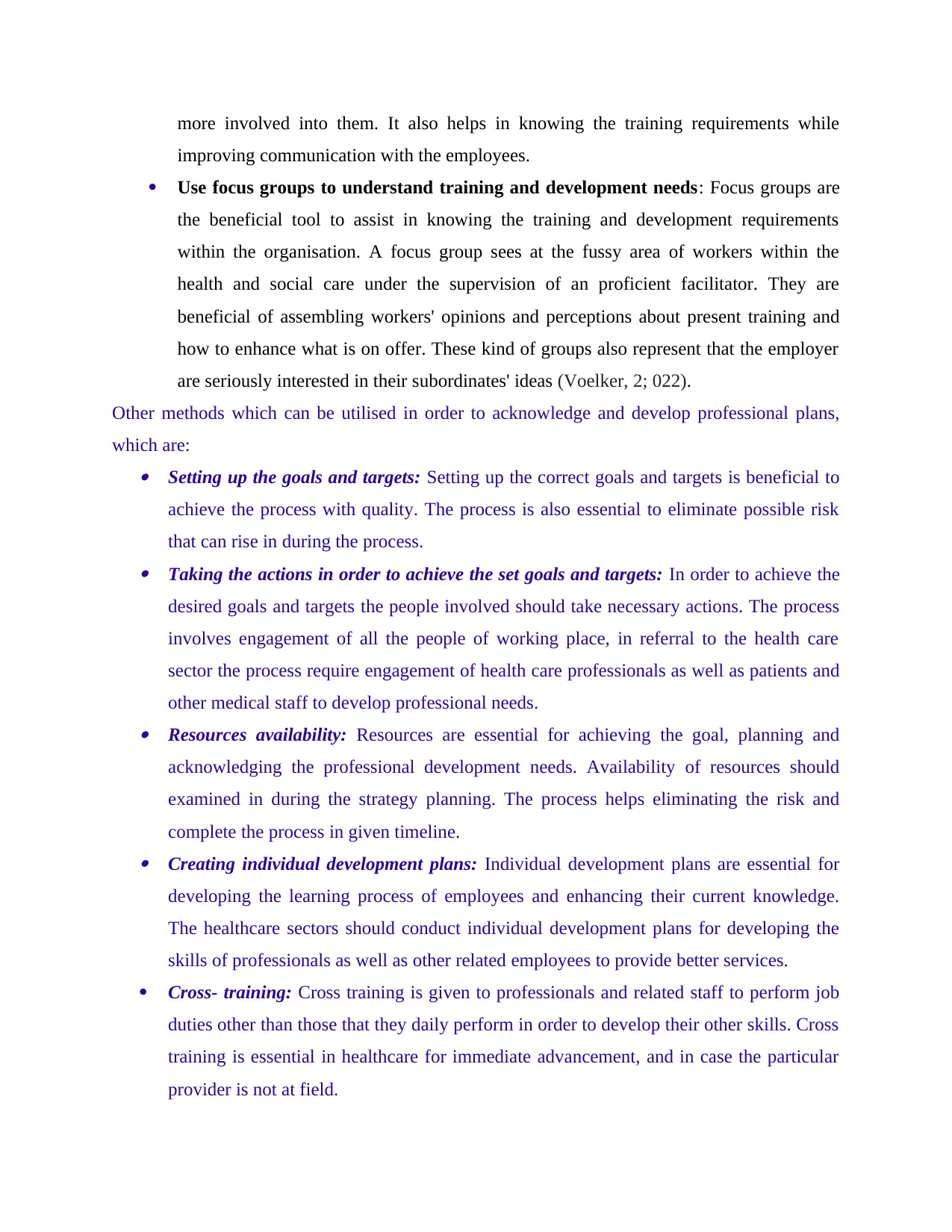
more involved into them. It also helps in knowing the training requirements while
improving communication with the employees.
Use focus groups to understand training and development needs: Focus groups are
the beneficial tool to assist in knowing the training and development requirements
within the organisation. A focus group sees at the fussy area of workers within the
health and social care under the supervision of an proficient facilitator. They are
beneficial of assembling workers' opinions and perceptions about present training and
how to enhance what is on offer. These kind of groups also represent that the employer
are seriously interested in their subordinates' ideas (Voelker, 2; 022).
Other methods which can be utilised in order to acknowledge and develop professional plans,
which are: Setting up the goals and targets: Setting up the correct goals and targets is beneficial to
achieve the process with quality. The process is also essential to eliminate possible risk
that can rise in during the process. Taking the actions in order to achieve the set goals and targets: In order to achieve the
desired goals and targets the people involved should take necessary actions. The process
involves engagement of all the people of working place, in referral to the health care
sector the process require engagement of health care professionals as well as patients and
other medical staff to develop professional needs. Resources availability: Resources are essential for achieving the goal, planning and
acknowledging the professional development needs. Availability of resources should
examined in during the strategy planning. The process helps eliminating the risk and
complete the process in given timeline. Creating individual development plans: Individual development plans are essential for
developing the learning process of employees and enhancing their current knowledge.
The healthcare sectors should conduct individual development plans for developing the
skills of professionals as well as other related employees to provide better services.
Cross- training: Cross training is given to professionals and related staff to perform job
duties other than those that they daily perform in order to develop their other skills. Cross
training is essential in healthcare for immediate advancement, and in case the particular
provider is not at field.
improving communication with the employees.
Use focus groups to understand training and development needs: Focus groups are
the beneficial tool to assist in knowing the training and development requirements
within the organisation. A focus group sees at the fussy area of workers within the
health and social care under the supervision of an proficient facilitator. They are
beneficial of assembling workers' opinions and perceptions about present training and
how to enhance what is on offer. These kind of groups also represent that the employer
are seriously interested in their subordinates' ideas (Voelker, 2; 022).
Other methods which can be utilised in order to acknowledge and develop professional plans,
which are: Setting up the goals and targets: Setting up the correct goals and targets is beneficial to
achieve the process with quality. The process is also essential to eliminate possible risk
that can rise in during the process. Taking the actions in order to achieve the set goals and targets: In order to achieve the
desired goals and targets the people involved should take necessary actions. The process
involves engagement of all the people of working place, in referral to the health care
sector the process require engagement of health care professionals as well as patients and
other medical staff to develop professional needs. Resources availability: Resources are essential for achieving the goal, planning and
acknowledging the professional development needs. Availability of resources should
examined in during the strategy planning. The process helps eliminating the risk and
complete the process in given timeline. Creating individual development plans: Individual development plans are essential for
developing the learning process of employees and enhancing their current knowledge.
The healthcare sectors should conduct individual development plans for developing the
skills of professionals as well as other related employees to provide better services.
Cross- training: Cross training is given to professionals and related staff to perform job
duties other than those that they daily perform in order to develop their other skills. Cross
training is essential in healthcare for immediate advancement, and in case the particular
provider is not at field.
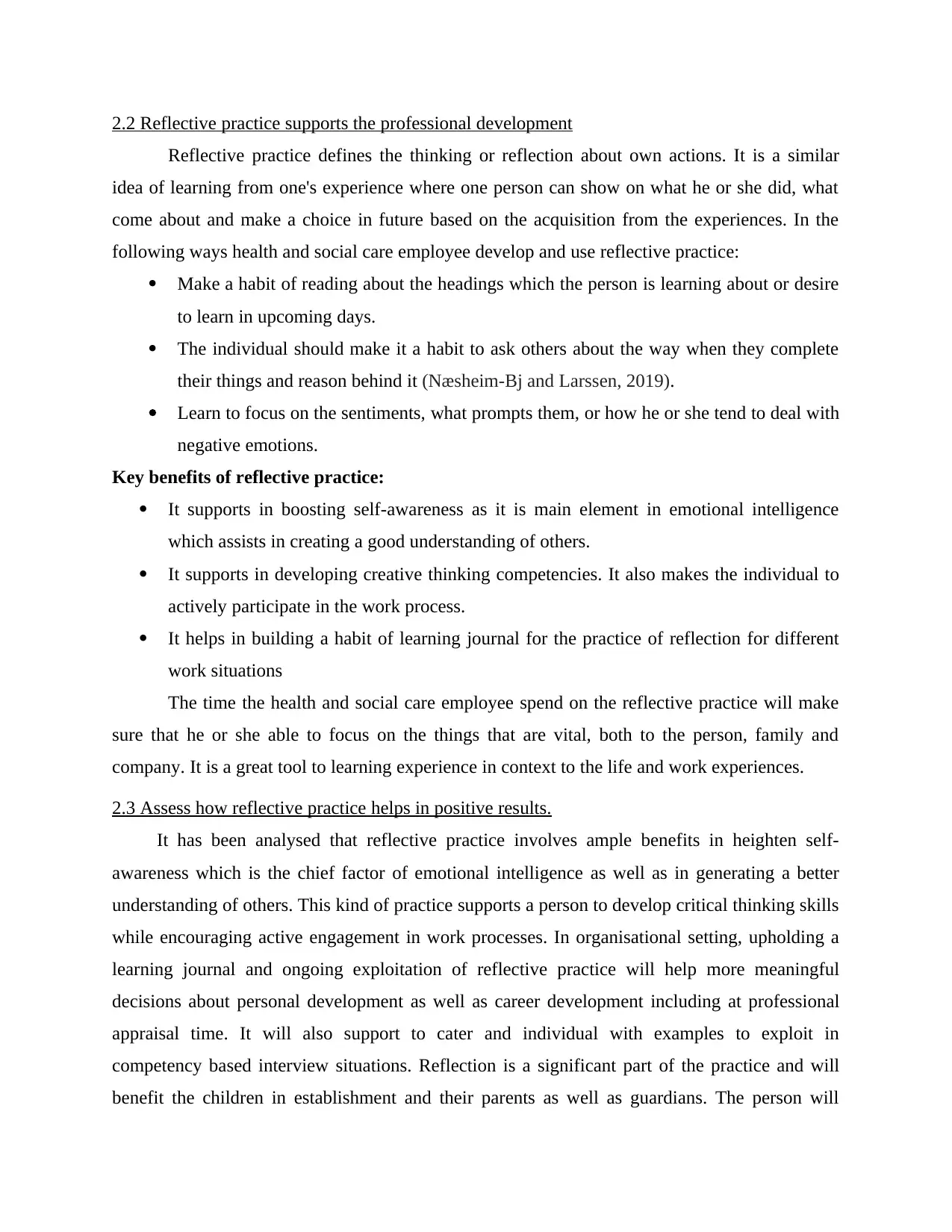
2.2 Reflective practice supports the professional development
Reflective practice defines the thinking or reflection about own actions. It is a similar
idea of learning from one's experience where one person can show on what he or she did, what
come about and make a choice in future based on the acquisition from the experiences. In the
following ways health and social care employee develop and use reflective practice:
Make a habit of reading about the headings which the person is learning about or desire
to learn in upcoming days.
The individual should make it a habit to ask others about the way when they complete
their things and reason behind it (Næsheim-Bj and Larssen, 2019).
Learn to focus on the sentiments, what prompts them, or how he or she tend to deal with
negative emotions.
Key benefits of reflective practice:
It supports in boosting self-awareness as it is main element in emotional intelligence
which assists in creating a good understanding of others.
It supports in developing creative thinking competencies. It also makes the individual to
actively participate in the work process.
It helps in building a habit of learning journal for the practice of reflection for different
work situations
The time the health and social care employee spend on the reflective practice will make
sure that he or she able to focus on the things that are vital, both to the person, family and
company. It is a great tool to learning experience in context to the life and work experiences.
2.3 Assess how reflective practice helps in positive results.
It has been analysed that reflective practice involves ample benefits in heighten self-
awareness which is the chief factor of emotional intelligence as well as in generating a better
understanding of others. This kind of practice supports a person to develop critical thinking skills
while encouraging active engagement in work processes. In organisational setting, upholding a
learning journal and ongoing exploitation of reflective practice will help more meaningful
decisions about personal development as well as career development including at professional
appraisal time. It will also support to cater and individual with examples to exploit in
competency based interview situations. Reflection is a significant part of the practice and will
benefit the children in establishment and their parents as well as guardians. The person will
Reflective practice defines the thinking or reflection about own actions. It is a similar
idea of learning from one's experience where one person can show on what he or she did, what
come about and make a choice in future based on the acquisition from the experiences. In the
following ways health and social care employee develop and use reflective practice:
Make a habit of reading about the headings which the person is learning about or desire
to learn in upcoming days.
The individual should make it a habit to ask others about the way when they complete
their things and reason behind it (Næsheim-Bj and Larssen, 2019).
Learn to focus on the sentiments, what prompts them, or how he or she tend to deal with
negative emotions.
Key benefits of reflective practice:
It supports in boosting self-awareness as it is main element in emotional intelligence
which assists in creating a good understanding of others.
It supports in developing creative thinking competencies. It also makes the individual to
actively participate in the work process.
It helps in building a habit of learning journal for the practice of reflection for different
work situations
The time the health and social care employee spend on the reflective practice will make
sure that he or she able to focus on the things that are vital, both to the person, family and
company. It is a great tool to learning experience in context to the life and work experiences.
2.3 Assess how reflective practice helps in positive results.
It has been analysed that reflective practice involves ample benefits in heighten self-
awareness which is the chief factor of emotional intelligence as well as in generating a better
understanding of others. This kind of practice supports a person to develop critical thinking skills
while encouraging active engagement in work processes. In organisational setting, upholding a
learning journal and ongoing exploitation of reflective practice will help more meaningful
decisions about personal development as well as career development including at professional
appraisal time. It will also support to cater and individual with examples to exploit in
competency based interview situations. Reflection is a significant part of the practice and will
benefit the children in establishment and their parents as well as guardians. The person will
Secure Best Marks with AI Grader
Need help grading? Try our AI Grader for instant feedback on your assignments.
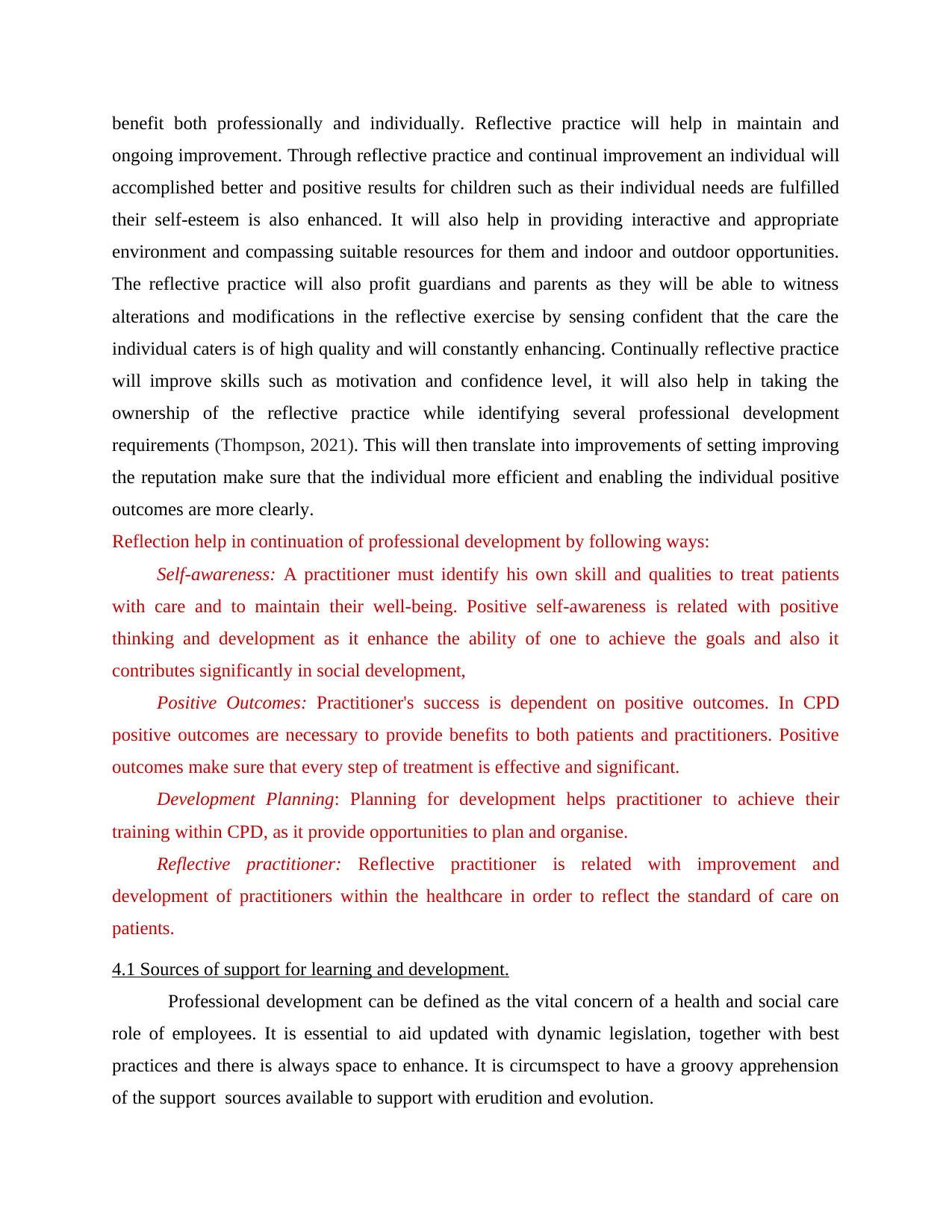
benefit both professionally and individually. Reflective practice will help in maintain and
ongoing improvement. Through reflective practice and continual improvement an individual will
accomplished better and positive results for children such as their individual needs are fulfilled
their self-esteem is also enhanced. It will also help in providing interactive and appropriate
environment and compassing suitable resources for them and indoor and outdoor opportunities.
The reflective practice will also profit guardians and parents as they will be able to witness
alterations and modifications in the reflective exercise by sensing confident that the care the
individual caters is of high quality and will constantly enhancing. Continually reflective practice
will improve skills such as motivation and confidence level, it will also help in taking the
ownership of the reflective practice while identifying several professional development
requirements (Thompson, 2021). This will then translate into improvements of setting improving
the reputation make sure that the individual more efficient and enabling the individual positive
outcomes are more clearly.
Reflection help in continuation of professional development by following ways:
Self-awareness: A practitioner must identify his own skill and qualities to treat patients
with care and to maintain their well-being. Positive self-awareness is related with positive
thinking and development as it enhance the ability of one to achieve the goals and also it
contributes significantly in social development,
Positive Outcomes: Practitioner's success is dependent on positive outcomes. In CPD
positive outcomes are necessary to provide benefits to both patients and practitioners. Positive
outcomes make sure that every step of treatment is effective and significant.
Development Planning: Planning for development helps practitioner to achieve their
training within CPD, as it provide opportunities to plan and organise.
Reflective practitioner: Reflective practitioner is related with improvement and
development of practitioners within the healthcare in order to reflect the standard of care on
patients.
4.1 Sources of support for learning and development.
Professional development can be defined as the vital concern of a health and social care
role of employees. It is essential to aid updated with dynamic legislation, together with best
practices and there is always space to enhance. It is circumspect to have a groovy apprehension
of the support sources available to support with erudition and evolution.
ongoing improvement. Through reflective practice and continual improvement an individual will
accomplished better and positive results for children such as their individual needs are fulfilled
their self-esteem is also enhanced. It will also help in providing interactive and appropriate
environment and compassing suitable resources for them and indoor and outdoor opportunities.
The reflective practice will also profit guardians and parents as they will be able to witness
alterations and modifications in the reflective exercise by sensing confident that the care the
individual caters is of high quality and will constantly enhancing. Continually reflective practice
will improve skills such as motivation and confidence level, it will also help in taking the
ownership of the reflective practice while identifying several professional development
requirements (Thompson, 2021). This will then translate into improvements of setting improving
the reputation make sure that the individual more efficient and enabling the individual positive
outcomes are more clearly.
Reflection help in continuation of professional development by following ways:
Self-awareness: A practitioner must identify his own skill and qualities to treat patients
with care and to maintain their well-being. Positive self-awareness is related with positive
thinking and development as it enhance the ability of one to achieve the goals and also it
contributes significantly in social development,
Positive Outcomes: Practitioner's success is dependent on positive outcomes. In CPD
positive outcomes are necessary to provide benefits to both patients and practitioners. Positive
outcomes make sure that every step of treatment is effective and significant.
Development Planning: Planning for development helps practitioner to achieve their
training within CPD, as it provide opportunities to plan and organise.
Reflective practitioner: Reflective practitioner is related with improvement and
development of practitioners within the healthcare in order to reflect the standard of care on
patients.
4.1 Sources of support for learning and development.
Professional development can be defined as the vital concern of a health and social care
role of employees. It is essential to aid updated with dynamic legislation, together with best
practices and there is always space to enhance. It is circumspect to have a groovy apprehension
of the support sources available to support with erudition and evolution.
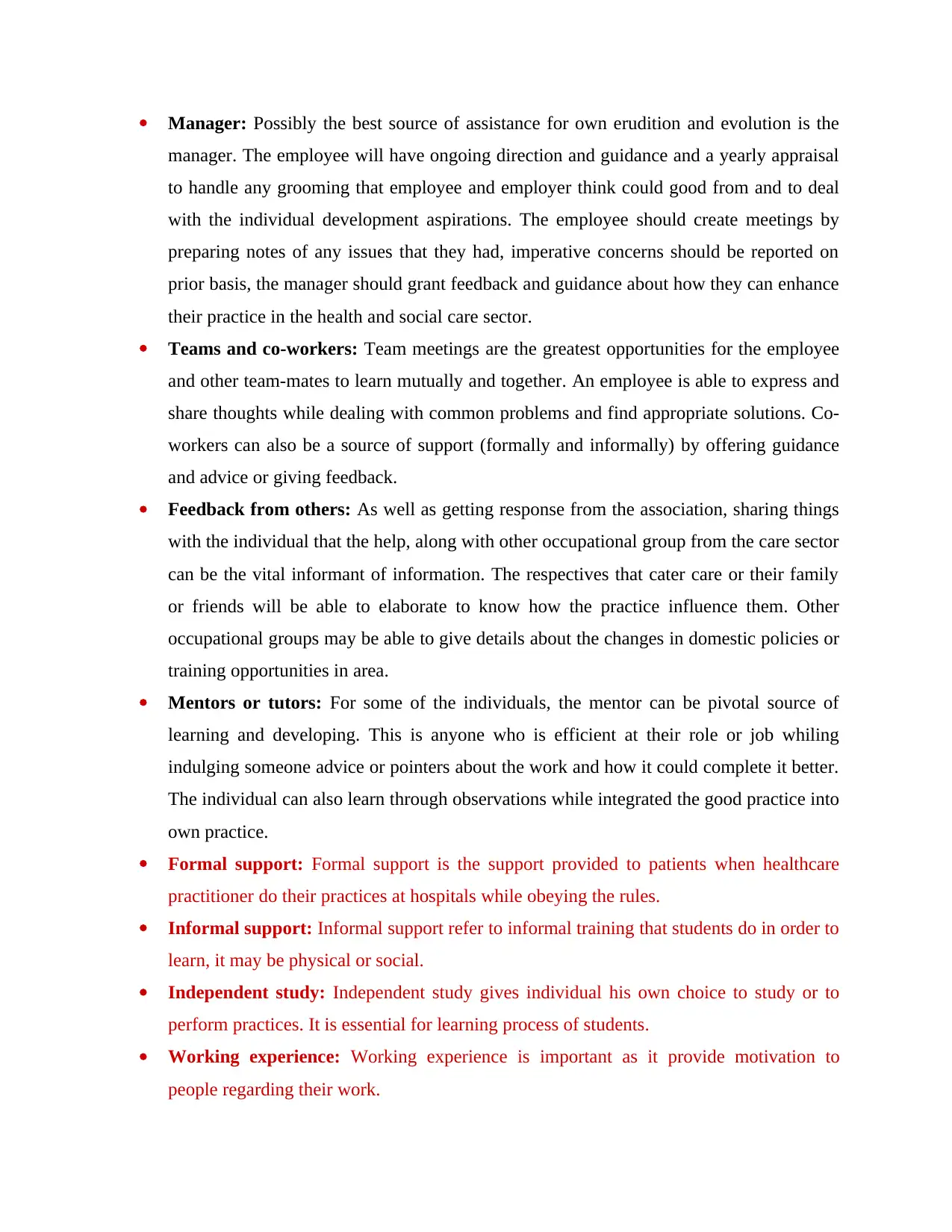
Manager: Possibly the best source of assistance for own erudition and evolution is the
manager. The employee will have ongoing direction and guidance and a yearly appraisal
to handle any grooming that employee and employer think could good from and to deal
with the individual development aspirations. The employee should create meetings by
preparing notes of any issues that they had, imperative concerns should be reported on
prior basis, the manager should grant feedback and guidance about how they can enhance
their practice in the health and social care sector.
Teams and co-workers: Team meetings are the greatest opportunities for the employee
and other team-mates to learn mutually and together. An employee is able to express and
share thoughts while dealing with common problems and find appropriate solutions. Co-
workers can also be a source of support (formally and informally) by offering guidance
and advice or giving feedback.
Feedback from others: As well as getting response from the association, sharing things
with the individual that the help, along with other occupational group from the care sector
can be the vital informant of information. The respectives that cater care or their family
or friends will be able to elaborate to know how the practice influence them. Other
occupational groups may be able to give details about the changes in domestic policies or
training opportunities in area.
Mentors or tutors: For some of the individuals, the mentor can be pivotal source of
learning and developing. This is anyone who is efficient at their role or job whiling
indulging someone advice or pointers about the work and how it could complete it better.
The individual can also learn through observations while integrated the good practice into
own practice.
Formal support: Formal support is the support provided to patients when healthcare
practitioner do their practices at hospitals while obeying the rules.
Informal support: Informal support refer to informal training that students do in order to
learn, it may be physical or social.
Independent study: Independent study gives individual his own choice to study or to
perform practices. It is essential for learning process of students.
Working experience: Working experience is important as it provide motivation to
people regarding their work.
manager. The employee will have ongoing direction and guidance and a yearly appraisal
to handle any grooming that employee and employer think could good from and to deal
with the individual development aspirations. The employee should create meetings by
preparing notes of any issues that they had, imperative concerns should be reported on
prior basis, the manager should grant feedback and guidance about how they can enhance
their practice in the health and social care sector.
Teams and co-workers: Team meetings are the greatest opportunities for the employee
and other team-mates to learn mutually and together. An employee is able to express and
share thoughts while dealing with common problems and find appropriate solutions. Co-
workers can also be a source of support (formally and informally) by offering guidance
and advice or giving feedback.
Feedback from others: As well as getting response from the association, sharing things
with the individual that the help, along with other occupational group from the care sector
can be the vital informant of information. The respectives that cater care or their family
or friends will be able to elaborate to know how the practice influence them. Other
occupational groups may be able to give details about the changes in domestic policies or
training opportunities in area.
Mentors or tutors: For some of the individuals, the mentor can be pivotal source of
learning and developing. This is anyone who is efficient at their role or job whiling
indulging someone advice or pointers about the work and how it could complete it better.
The individual can also learn through observations while integrated the good practice into
own practice.
Formal support: Formal support is the support provided to patients when healthcare
practitioner do their practices at hospitals while obeying the rules.
Informal support: Informal support refer to informal training that students do in order to
learn, it may be physical or social.
Independent study: Independent study gives individual his own choice to study or to
perform practices. It is essential for learning process of students.
Working experience: Working experience is important as it provide motivation to
people regarding their work.
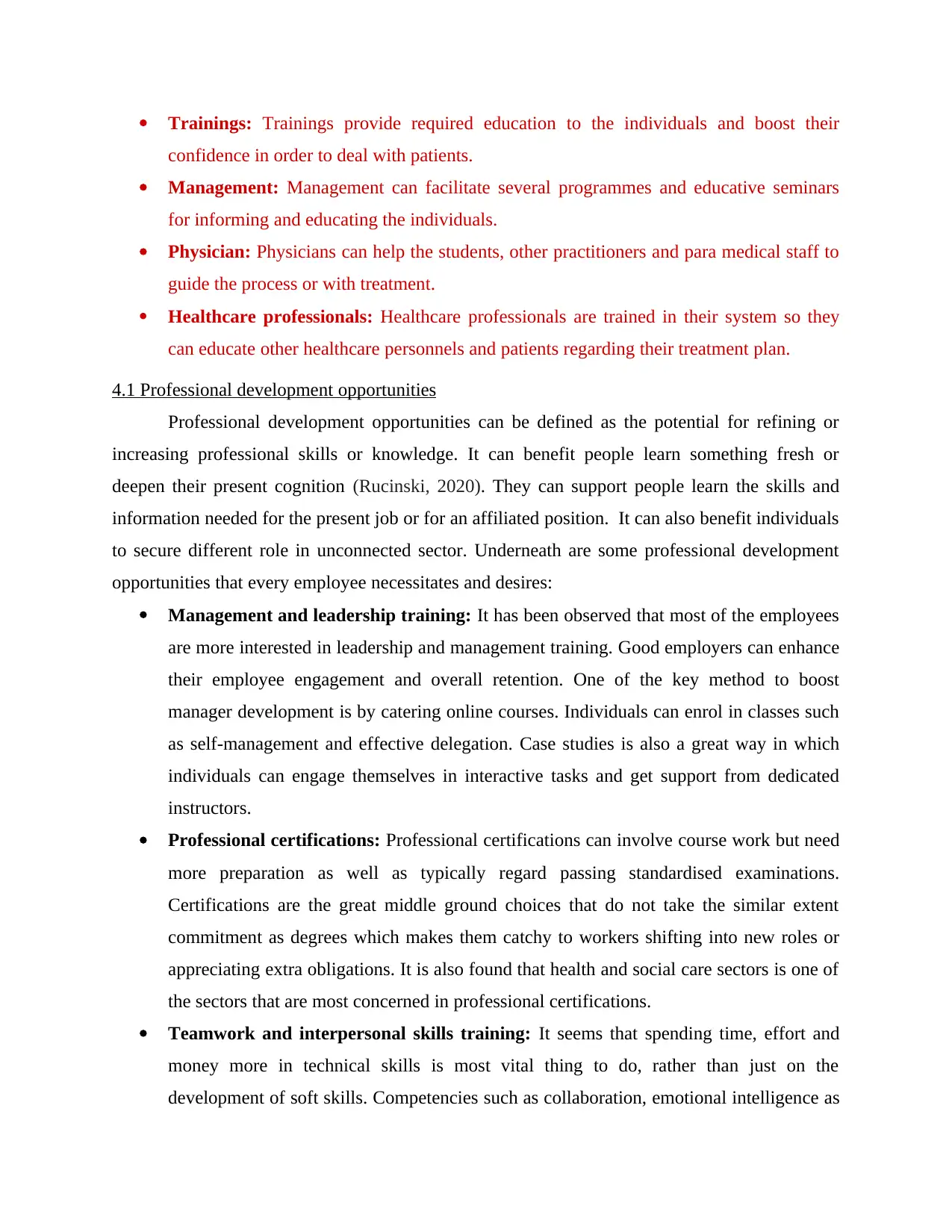
Trainings: Trainings provide required education to the individuals and boost their
confidence in order to deal with patients.
Management: Management can facilitate several programmes and educative seminars
for informing and educating the individuals.
Physician: Physicians can help the students, other practitioners and para medical staff to
guide the process or with treatment.
Healthcare professionals: Healthcare professionals are trained in their system so they
can educate other healthcare personnels and patients regarding their treatment plan.
4.1 Professional development opportunities
Professional development opportunities can be defined as the potential for refining or
increasing professional skills or knowledge. It can benefit people learn something fresh or
deepen their present cognition (Rucinski, 2020). They can support people learn the skills and
information needed for the present job or for an affiliated position. It can also benefit individuals
to secure different role in unconnected sector. Underneath are some professional development
opportunities that every employee necessitates and desires:
Management and leadership training: It has been observed that most of the employees
are more interested in leadership and management training. Good employers can enhance
their employee engagement and overall retention. One of the key method to boost
manager development is by catering online courses. Individuals can enrol in classes such
as self-management and effective delegation. Case studies is also a great way in which
individuals can engage themselves in interactive tasks and get support from dedicated
instructors.
Professional certifications: Professional certifications can involve course work but need
more preparation as well as typically regard passing standardised examinations.
Certifications are the great middle ground choices that do not take the similar extent
commitment as degrees which makes them catchy to workers shifting into new roles or
appreciating extra obligations. It is also found that health and social care sectors is one of
the sectors that are most concerned in professional certifications.
Teamwork and interpersonal skills training: It seems that spending time, effort and
money more in technical skills is most vital thing to do, rather than just on the
development of soft skills. Competencies such as collaboration, emotional intelligence as
confidence in order to deal with patients.
Management: Management can facilitate several programmes and educative seminars
for informing and educating the individuals.
Physician: Physicians can help the students, other practitioners and para medical staff to
guide the process or with treatment.
Healthcare professionals: Healthcare professionals are trained in their system so they
can educate other healthcare personnels and patients regarding their treatment plan.
4.1 Professional development opportunities
Professional development opportunities can be defined as the potential for refining or
increasing professional skills or knowledge. It can benefit people learn something fresh or
deepen their present cognition (Rucinski, 2020). They can support people learn the skills and
information needed for the present job or for an affiliated position. It can also benefit individuals
to secure different role in unconnected sector. Underneath are some professional development
opportunities that every employee necessitates and desires:
Management and leadership training: It has been observed that most of the employees
are more interested in leadership and management training. Good employers can enhance
their employee engagement and overall retention. One of the key method to boost
manager development is by catering online courses. Individuals can enrol in classes such
as self-management and effective delegation. Case studies is also a great way in which
individuals can engage themselves in interactive tasks and get support from dedicated
instructors.
Professional certifications: Professional certifications can involve course work but need
more preparation as well as typically regard passing standardised examinations.
Certifications are the great middle ground choices that do not take the similar extent
commitment as degrees which makes them catchy to workers shifting into new roles or
appreciating extra obligations. It is also found that health and social care sectors is one of
the sectors that are most concerned in professional certifications.
Teamwork and interpersonal skills training: It seems that spending time, effort and
money more in technical skills is most vital thing to do, rather than just on the
development of soft skills. Competencies such as collaboration, emotional intelligence as
Paraphrase This Document
Need a fresh take? Get an instant paraphrase of this document with our AI Paraphraser
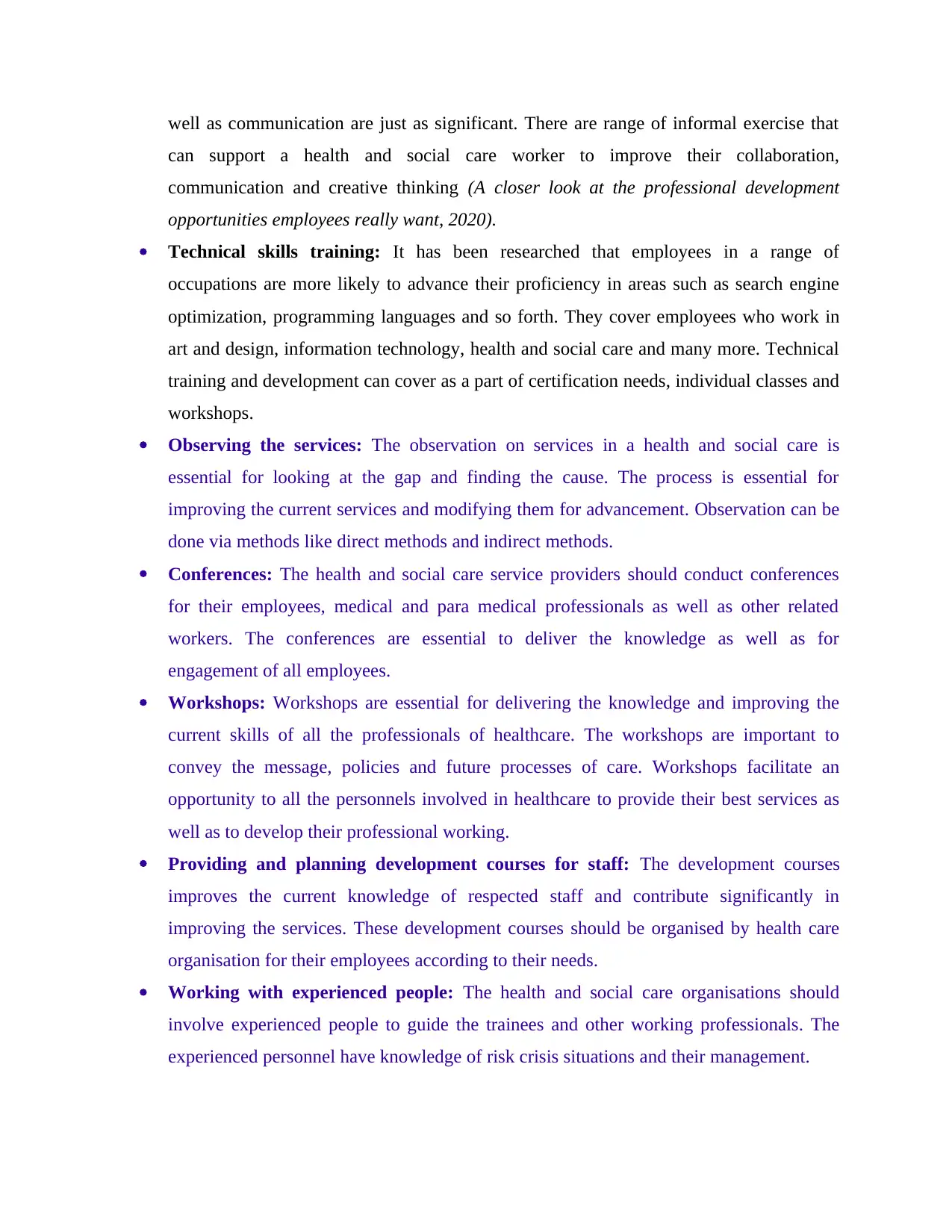
well as communication are just as significant. There are range of informal exercise that
can support a health and social care worker to improve their collaboration,
communication and creative thinking (A closer look at the professional development
opportunities employees really want, 2020).
Technical skills training: It has been researched that employees in a range of
occupations are more likely to advance their proficiency in areas such as search engine
optimization, programming languages and so forth. They cover employees who work in
art and design, information technology, health and social care and many more. Technical
training and development can cover as a part of certification needs, individual classes and
workshops.
Observing the services: The observation on services in a health and social care is
essential for looking at the gap and finding the cause. The process is essential for
improving the current services and modifying them for advancement. Observation can be
done via methods like direct methods and indirect methods.
Conferences: The health and social care service providers should conduct conferences
for their employees, medical and para medical professionals as well as other related
workers. The conferences are essential to deliver the knowledge as well as for
engagement of all employees.
Workshops: Workshops are essential for delivering the knowledge and improving the
current skills of all the professionals of healthcare. The workshops are important to
convey the message, policies and future processes of care. Workshops facilitate an
opportunity to all the personnels involved in healthcare to provide their best services as
well as to develop their professional working.
Providing and planning development courses for staff: The development courses
improves the current knowledge of respected staff and contribute significantly in
improving the services. These development courses should be organised by health care
organisation for their employees according to their needs.
Working with experienced people: The health and social care organisations should
involve experienced people to guide the trainees and other working professionals. The
experienced personnel have knowledge of risk crisis situations and their management.
can support a health and social care worker to improve their collaboration,
communication and creative thinking (A closer look at the professional development
opportunities employees really want, 2020).
Technical skills training: It has been researched that employees in a range of
occupations are more likely to advance their proficiency in areas such as search engine
optimization, programming languages and so forth. They cover employees who work in
art and design, information technology, health and social care and many more. Technical
training and development can cover as a part of certification needs, individual classes and
workshops.
Observing the services: The observation on services in a health and social care is
essential for looking at the gap and finding the cause. The process is essential for
improving the current services and modifying them for advancement. Observation can be
done via methods like direct methods and indirect methods.
Conferences: The health and social care service providers should conduct conferences
for their employees, medical and para medical professionals as well as other related
workers. The conferences are essential to deliver the knowledge as well as for
engagement of all employees.
Workshops: Workshops are essential for delivering the knowledge and improving the
current skills of all the professionals of healthcare. The workshops are important to
convey the message, policies and future processes of care. Workshops facilitate an
opportunity to all the personnels involved in healthcare to provide their best services as
well as to develop their professional working.
Providing and planning development courses for staff: The development courses
improves the current knowledge of respected staff and contribute significantly in
improving the services. These development courses should be organised by health care
organisation for their employees according to their needs.
Working with experienced people: The health and social care organisations should
involve experienced people to guide the trainees and other working professionals. The
experienced personnel have knowledge of risk crisis situations and their management.
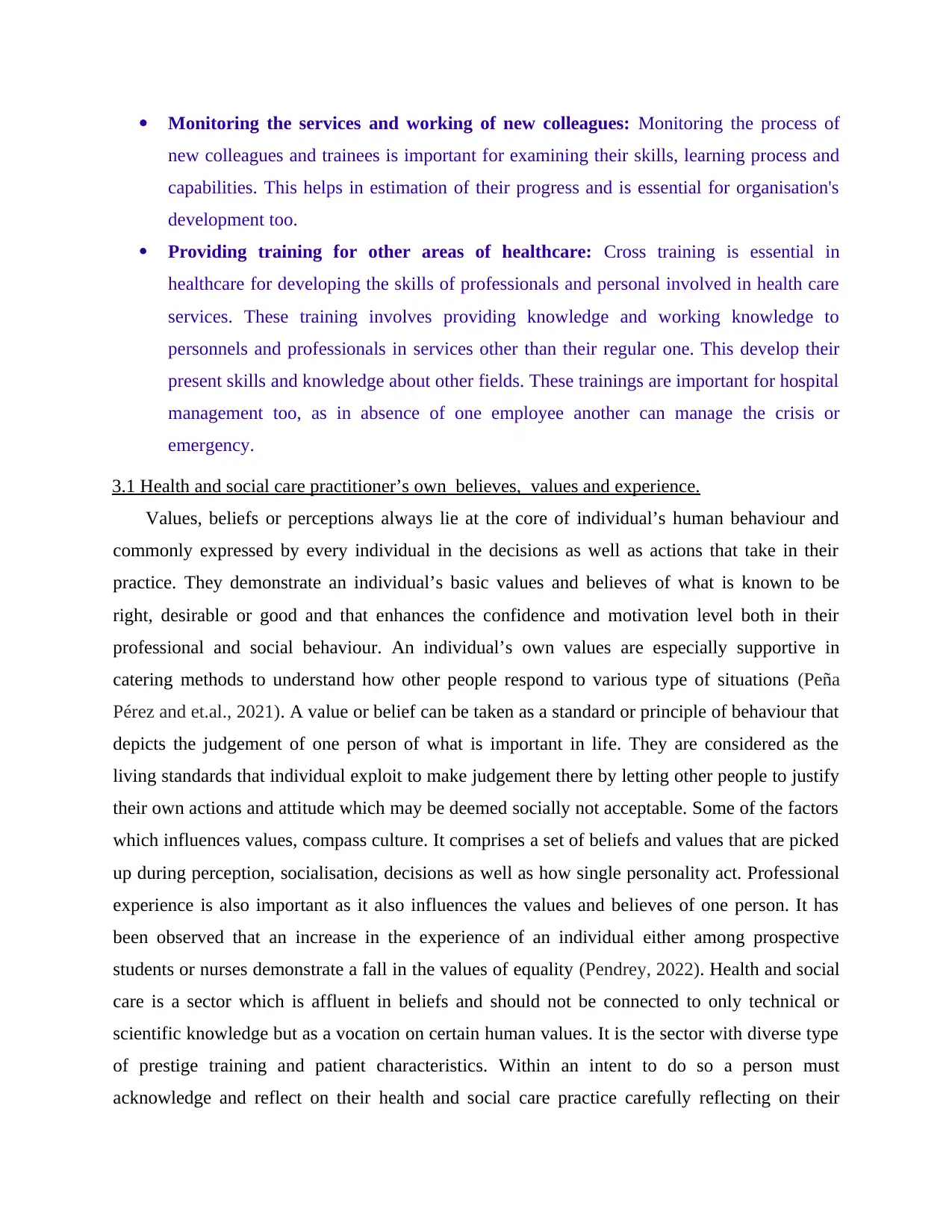
Monitoring the services and working of new colleagues: Monitoring the process of
new colleagues and trainees is important for examining their skills, learning process and
capabilities. This helps in estimation of their progress and is essential for organisation's
development too.
Providing training for other areas of healthcare: Cross training is essential in
healthcare for developing the skills of professionals and personal involved in health care
services. These training involves providing knowledge and working knowledge to
personnels and professionals in services other than their regular one. This develop their
present skills and knowledge about other fields. These trainings are important for hospital
management too, as in absence of one employee another can manage the crisis or
emergency.
3.1 Health and social care practitioner’s own believes, values and experience.
Values, beliefs or perceptions always lie at the core of individual’s human behaviour and
commonly expressed by every individual in the decisions as well as actions that take in their
practice. They demonstrate an individual’s basic values and believes of what is known to be
right, desirable or good and that enhances the confidence and motivation level both in their
professional and social behaviour. An individual’s own values are especially supportive in
catering methods to understand how other people respond to various type of situations (Peña
Pérez and et.al., 2021). A value or belief can be taken as a standard or principle of behaviour that
depicts the judgement of one person of what is important in life. They are considered as the
living standards that individual exploit to make judgement there by letting other people to justify
their own actions and attitude which may be deemed socially not acceptable. Some of the factors
which influences values, compass culture. It comprises a set of beliefs and values that are picked
up during perception, socialisation, decisions as well as how single personality act. Professional
experience is also important as it also influences the values and believes of one person. It has
been observed that an increase in the experience of an individual either among prospective
students or nurses demonstrate a fall in the values of equality (Pendrey, 2022). Health and social
care is a sector which is affluent in beliefs and should not be connected to only technical or
scientific knowledge but as a vocation on certain human values. It is the sector with diverse type
of prestige training and patient characteristics. Within an intent to do so a person must
acknowledge and reflect on their health and social care practice carefully reflecting on their
new colleagues and trainees is important for examining their skills, learning process and
capabilities. This helps in estimation of their progress and is essential for organisation's
development too.
Providing training for other areas of healthcare: Cross training is essential in
healthcare for developing the skills of professionals and personal involved in health care
services. These training involves providing knowledge and working knowledge to
personnels and professionals in services other than their regular one. This develop their
present skills and knowledge about other fields. These trainings are important for hospital
management too, as in absence of one employee another can manage the crisis or
emergency.
3.1 Health and social care practitioner’s own believes, values and experience.
Values, beliefs or perceptions always lie at the core of individual’s human behaviour and
commonly expressed by every individual in the decisions as well as actions that take in their
practice. They demonstrate an individual’s basic values and believes of what is known to be
right, desirable or good and that enhances the confidence and motivation level both in their
professional and social behaviour. An individual’s own values are especially supportive in
catering methods to understand how other people respond to various type of situations (Peña
Pérez and et.al., 2021). A value or belief can be taken as a standard or principle of behaviour that
depicts the judgement of one person of what is important in life. They are considered as the
living standards that individual exploit to make judgement there by letting other people to justify
their own actions and attitude which may be deemed socially not acceptable. Some of the factors
which influences values, compass culture. It comprises a set of beliefs and values that are picked
up during perception, socialisation, decisions as well as how single personality act. Professional
experience is also important as it also influences the values and believes of one person. It has
been observed that an increase in the experience of an individual either among prospective
students or nurses demonstrate a fall in the values of equality (Pendrey, 2022). Health and social
care is a sector which is affluent in beliefs and should not be connected to only technical or
scientific knowledge but as a vocation on certain human values. It is the sector with diverse type
of prestige training and patient characteristics. Within an intent to do so a person must
acknowledge and reflect on their health and social care practice carefully reflecting on their
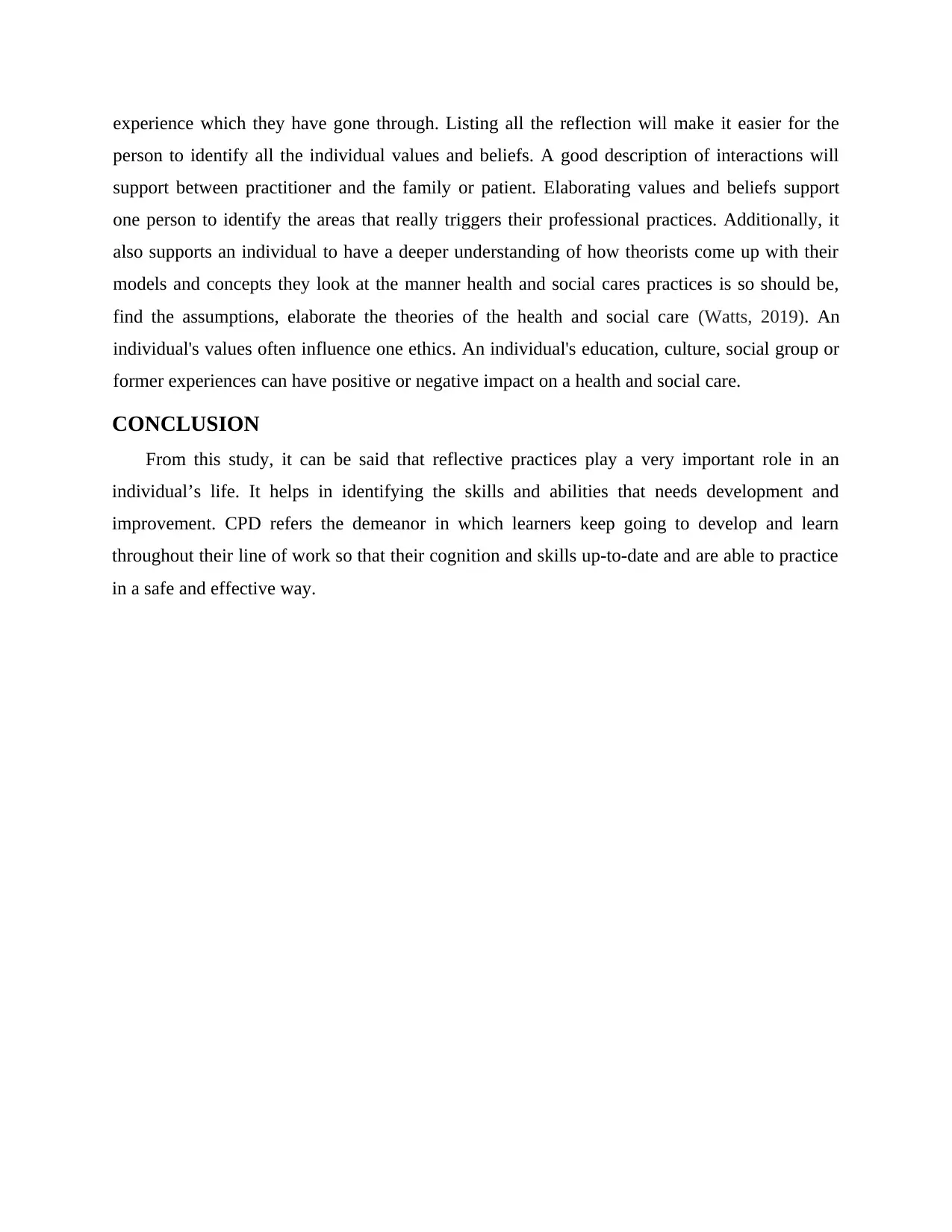
experience which they have gone through. Listing all the reflection will make it easier for the
person to identify all the individual values and beliefs. A good description of interactions will
support between practitioner and the family or patient. Elaborating values and beliefs support
one person to identify the areas that really triggers their professional practices. Additionally, it
also supports an individual to have a deeper understanding of how theorists come up with their
models and concepts they look at the manner health and social cares practices is so should be,
find the assumptions, elaborate the theories of the health and social care (Watts, 2019). An
individual's values often influence one ethics. An individual's education, culture, social group or
former experiences can have positive or negative impact on a health and social care.
CONCLUSION
From this study, it can be said that reflective practices play a very important role in an
individual’s life. It helps in identifying the skills and abilities that needs development and
improvement. CPD refers the demeanor in which learners keep going to develop and learn
throughout their line of work so that their cognition and skills up-to-date and are able to practice
in a safe and effective way.
person to identify all the individual values and beliefs. A good description of interactions will
support between practitioner and the family or patient. Elaborating values and beliefs support
one person to identify the areas that really triggers their professional practices. Additionally, it
also supports an individual to have a deeper understanding of how theorists come up with their
models and concepts they look at the manner health and social cares practices is so should be,
find the assumptions, elaborate the theories of the health and social care (Watts, 2019). An
individual's values often influence one ethics. An individual's education, culture, social group or
former experiences can have positive or negative impact on a health and social care.
CONCLUSION
From this study, it can be said that reflective practices play a very important role in an
individual’s life. It helps in identifying the skills and abilities that needs development and
improvement. CPD refers the demeanor in which learners keep going to develop and learn
throughout their line of work so that their cognition and skills up-to-date and are able to practice
in a safe and effective way.
Secure Best Marks with AI Grader
Need help grading? Try our AI Grader for instant feedback on your assignments.
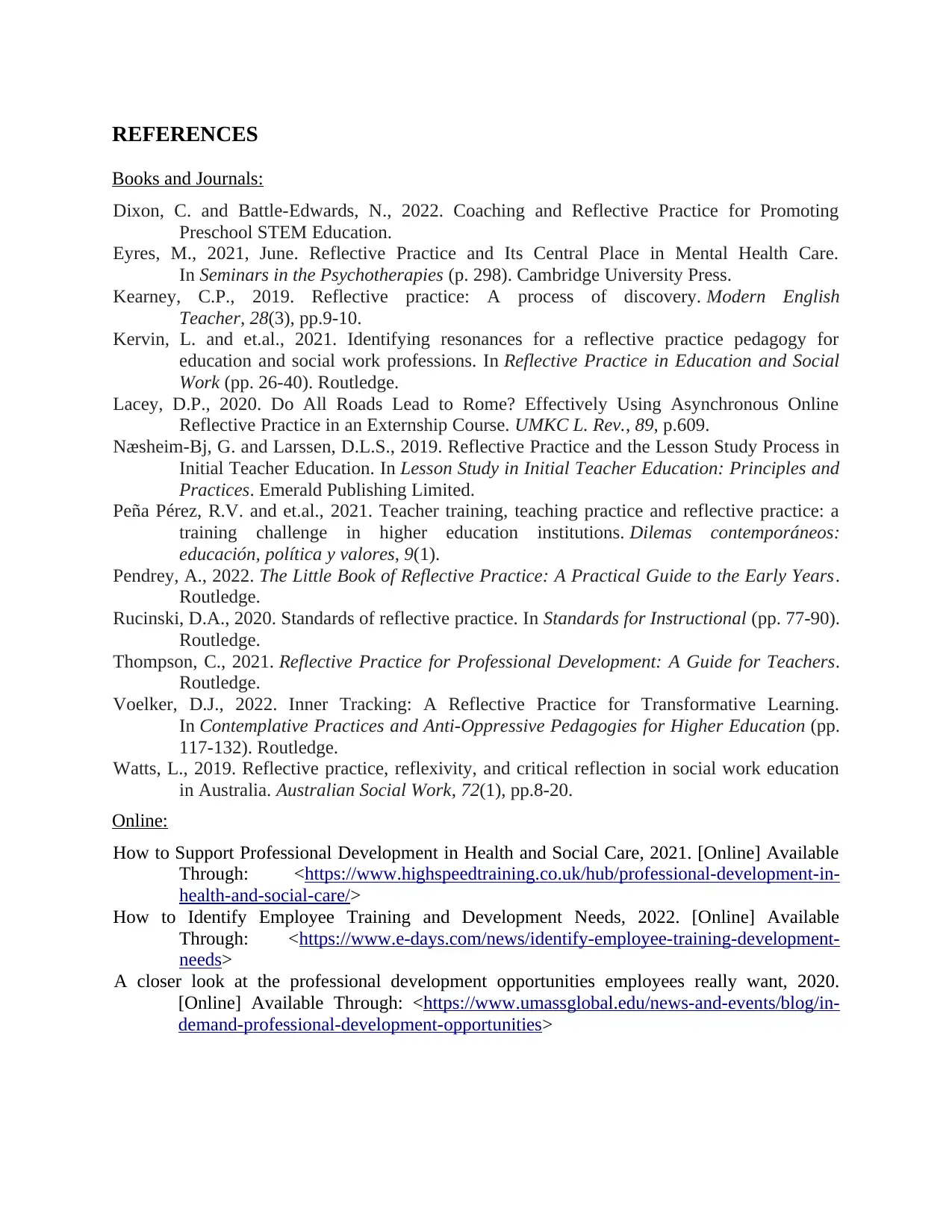
REFERENCES
Books and Journals:
Dixon, C. and Battle-Edwards, N., 2022. Coaching and Reflective Practice for Promoting
Preschool STEM Education.
Eyres, M., 2021, June. Reflective Practice and Its Central Place in Mental Health Care.
In Seminars in the Psychotherapies (p. 298). Cambridge University Press.
Kearney, C.P., 2019. Reflective practice: A process of discovery. Modern English
Teacher, 28(3), pp.9-10.
Kervin, L. and et.al., 2021. Identifying resonances for a reflective practice pedagogy for
education and social work professions. In Reflective Practice in Education and Social
Work (pp. 26-40). Routledge.
Lacey, D.P., 2020. Do All Roads Lead to Rome? Effectively Using Asynchronous Online
Reflective Practice in an Externship Course. UMKC L. Rev., 89, p.609.
Næsheim-Bj, G. and Larssen, D.L.S., 2019. Reflective Practice and the Lesson Study Process in
Initial Teacher Education. In Lesson Study in Initial Teacher Education: Principles and
Practices. Emerald Publishing Limited.
Peña Pérez, R.V. and et.al., 2021. Teacher training, teaching practice and reflective practice: a
training challenge in higher education institutions. Dilemas contemporáneos:
educación, política y valores, 9(1).
Pendrey, A., 2022. The Little Book of Reflective Practice: A Practical Guide to the Early Years.
Routledge.
Rucinski, D.A., 2020. Standards of reflective practice. In Standards for Instructional (pp. 77-90).
Routledge.
Thompson, C., 2021. Reflective Practice for Professional Development: A Guide for Teachers.
Routledge.
Voelker, D.J., 2022. Inner Tracking: A Reflective Practice for Transformative Learning.
In Contemplative Practices and Anti-Oppressive Pedagogies for Higher Education (pp.
117-132). Routledge.
Watts, L., 2019. Reflective practice, reflexivity, and critical reflection in social work education
in Australia. Australian Social Work, 72(1), pp.8-20.
Online:
How to Support Professional Development in Health and Social Care, 2021. [Online] Available
Through: <https://www.highspeedtraining.co.uk/hub/professional-development-in-
health-and-social-care/>
How to Identify Employee Training and Development Needs, 2022. [Online] Available
Through: <https://www.e-days.com/news/identify-employee-training-development-
needs>
A closer look at the professional development opportunities employees really want, 2020.
[Online] Available Through: <https://www.umassglobal.edu/news-and-events/blog/in-
demand-professional-development-opportunities>
Books and Journals:
Dixon, C. and Battle-Edwards, N., 2022. Coaching and Reflective Practice for Promoting
Preschool STEM Education.
Eyres, M., 2021, June. Reflective Practice and Its Central Place in Mental Health Care.
In Seminars in the Psychotherapies (p. 298). Cambridge University Press.
Kearney, C.P., 2019. Reflective practice: A process of discovery. Modern English
Teacher, 28(3), pp.9-10.
Kervin, L. and et.al., 2021. Identifying resonances for a reflective practice pedagogy for
education and social work professions. In Reflective Practice in Education and Social
Work (pp. 26-40). Routledge.
Lacey, D.P., 2020. Do All Roads Lead to Rome? Effectively Using Asynchronous Online
Reflective Practice in an Externship Course. UMKC L. Rev., 89, p.609.
Næsheim-Bj, G. and Larssen, D.L.S., 2019. Reflective Practice and the Lesson Study Process in
Initial Teacher Education. In Lesson Study in Initial Teacher Education: Principles and
Practices. Emerald Publishing Limited.
Peña Pérez, R.V. and et.al., 2021. Teacher training, teaching practice and reflective practice: a
training challenge in higher education institutions. Dilemas contemporáneos:
educación, política y valores, 9(1).
Pendrey, A., 2022. The Little Book of Reflective Practice: A Practical Guide to the Early Years.
Routledge.
Rucinski, D.A., 2020. Standards of reflective practice. In Standards for Instructional (pp. 77-90).
Routledge.
Thompson, C., 2021. Reflective Practice for Professional Development: A Guide for Teachers.
Routledge.
Voelker, D.J., 2022. Inner Tracking: A Reflective Practice for Transformative Learning.
In Contemplative Practices and Anti-Oppressive Pedagogies for Higher Education (pp.
117-132). Routledge.
Watts, L., 2019. Reflective practice, reflexivity, and critical reflection in social work education
in Australia. Australian Social Work, 72(1), pp.8-20.
Online:
How to Support Professional Development in Health and Social Care, 2021. [Online] Available
Through: <https://www.highspeedtraining.co.uk/hub/professional-development-in-
health-and-social-care/>
How to Identify Employee Training and Development Needs, 2022. [Online] Available
Through: <https://www.e-days.com/news/identify-employee-training-development-
needs>
A closer look at the professional development opportunities employees really want, 2020.
[Online] Available Through: <https://www.umassglobal.edu/news-and-events/blog/in-
demand-professional-development-opportunities>

1 out of 18
Related Documents
Your All-in-One AI-Powered Toolkit for Academic Success.
+13062052269
info@desklib.com
Available 24*7 on WhatsApp / Email
![[object Object]](/_next/static/media/star-bottom.7253800d.svg)
Unlock your academic potential
© 2024 | Zucol Services PVT LTD | All rights reserved.





